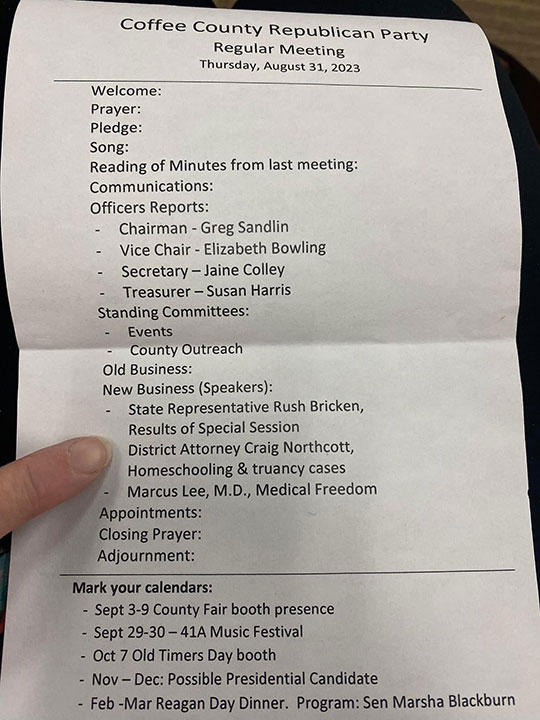Image Credit: Coffee County GOP / Facebook
The Tennessee Conservative [By Paula Gomes] –
The District Attorney in Coffee County where a Juvenile Court Judge ordered a homeschooled student back to public school addressed the local Republican Party at their regular meeting on Thursday night about “Homeschooling and Truancy Cases.”
According to our sources, “No Questions” Northcutt pacified Republicans with a pro-homeschooling narrative but took no questions from the 20% of attendees who were at the meeting specifically to hear from him on this issue.
After a briefing on the legislative special session by Representative Rush Bricken and Senator Janice Bowling, DA Craig Northcutt was the next to speak.

The audience was asked for a show of hands on who was aware of the recent publicity surrounding homeschooling and the Juvenile Court system in Coffee County. About twenty hands went up in a crowd of a hundred. This polling set the stage for a presentation that did two things, pacify an uninformed citizenry about how sound the juvenile court system functions, and silence the concerned citizens who may challenge him. And that is exactly what happened.
Amber Taylor is a mother in Coffee County who was traumatized in a recent Juvenile Court hearing when Judge Gerald Ewell Jr. told her that “home-school was no school” and threatened that her daughter would be “sent off” if she was not on the door steps of the public school the following morning. That story, and a recording of the judge’s comments, drew the ire of homeschooling parents across the state.
Northcutt began by exalting homeschooling. He talked about how he has supported parents who homeschool their children and how much better it is for children academically and spiritually. He then turned to the public policy issue of parents who “do not get their children to school” and then “pull them out” to home school them. He stated that “if a child is in truancy status,” the law prevents a parent from taking the child out of school to homeschool. Northcutt did not provide a citation to the law. While it was an audience of everyday citizens who may not be concerned with code numbers, he already knew that the audience included parents who did know the law and did want to challenge the handling of the Taylor case.
Northcutt then went on to state that the recording of the judge’s statements should never have been released and described how the juvenile court system – designed to help children – was confidential, meaning “secret,” “closed,” “hidden” from the public. He described in detail how unruly child cases differ from criminal cases and how his office frequently left the consequences for children and families up to the juvenile court judge without District Attorney involvement.
He also complained about inaccuracies in the news reporting.
He concluded with three points:
(1) that he would always advocate for homeschooling
(2) that “for the child’s sake” this should have “never come to this light” (meaning the publicity)
(3) don’t believe everything you read.
He then stated that if there was a question, to ask him. However, that did not happen.

At the end of his presentation that lasted about 20 minutes, the program quickly moved on. A comment was made that questions could be reserved until after both Northcutt and Dr. Marcus Lee, the other invited speaker, had finished.
Dr. Lee gave a long dissertation about treating Covid, emergency-use vaccines, Ivermectin, early treatment, and the inadequacy of masks. The audience was invited to engage with him and ask questions, which they did. Time slipped by.
At 8:30 pm, someone said, “One last question for Dr. Lee,” and then the program ended. No one was allowed to ask Northcutt a question. He then slipped out the door before he could be questioned directly.
Tennessee’s compulsory attendance law is found in Tennessee Code Title 49, Chapter 6. This includes the description of “home school” which is codified at Tenn. Code. 49-6-3050. It has its own set of laws regarding enrollment, attendance records, and education requirements for the instructor. Tenn. Code 49-6-3007 describes attendance and truancy, and how it is addressed by the schools and law enforcement. Subsection (i)(3), says that a student who has been absent an aggregate of three (3) days without adequate excuse may be deemed habitually truant. The school can send a list of “truant” students which includes their home address to the police who can pick up that child wherever they are found, unless they are with their parents. Law enforcement can deliver the child back to the parent, or the school, or Juvenile Court.
Critically, Subsection (i)(6), just a quick scroll down the page, states that “this subsection (i) shall not apply to students enrolled in home and non public schools.”
This really does not answer the question arising from Northcutt’s speech. Tenn. Code 49-6-3007, in its entirety, gives a detailed description of how truancy works in Tennessee. Subsection (d) describes how public and private schools shall keep daily reports of attendance (no mention of home school). Subsection (e) describes the duty of the director of schools to report the names of children who have withdrawn from school or been absent five days without excuse. And Subsection (f) commands the director of schools to report any child who is habitually absent to the juvenile court judge in that county “to be dealt with in such a manner as the judge may determine to be in the best interest of the child”, including assessing the parents a fine of fifty (50) dollars “in the discretion of the judge”.

But that’s not all. Tenn. Code 49-3-3009 criminalizes parents for truancy. This section requires the schools to establish a “progressive truancy intervention plan” which “must be applied prior to referral to juvenile court” under 3007. This requires conferences, written notices, and referral to community based services if needed. The school is not allowed to use suspension as a punishment for truancy. The school is required to provide a statement to the juvenile court that the school has applied the truancy intervention planned and it has failed. If the school fails to do so, any truancy action by the school must be dismissed by the juvenile Court. A parent’s failure to comply with the intervention plan, can result in a Class C misdemeanor for each day that the child misses school, and the parent can be cited for educational neglect which triggers an investigation and possible child removal by the Department of Children’s Services. The law is not clear how Juvenile Court has jurisdiction to prosecute crimes against adults.
Northcutt stated that a truant child was classified as ‘unruly’ in juvenile court jurisdiction. The Juvenile Court’s control of ‘unruly’ children is controlled by Tenn. Code Ann. 37-1-132. This statute appears to place some limitations on the Juvenile Court, but does it really? Unruly children cannot be placed on probation unless they are also found to be delinquent (a criminal act), or unless they violate a ‘valid court order’. And they can only be committed to DCS if they reach ‘strike three’ for unruly offenses, or the juvenile court judge finds evidence that the child is in imminent risk of danger to the child’s health or safety, or the juvenile court judge deems that the child needs treatment that are available only if the child is placed in the custody of the state. And once left to the devices of the state, it is the DCS commissioner that gets to decide when the child has completed treatment, and only then after the juvenile court judge agrees. The statue goes on to describe a lot of what ifs, buts, and whens, but the net result is that missing three-days of school can trigger events that lead families into a dark hole of separation and loss of control.
The ‘just don’t’ miss school’ answer is not satisfactory for families in these complex times. Single parent homes, family illnesses, and COVID create a complex web of family circumstances in which parents have to make difficult choices. Then there is school bullying, CRT, sex education, and liberal agendas that are driving more and more parents into a mental frenzy over the safety of their kids in the public school environment.
And all of this does not even address the monetary benefits to schools that are tied to attendance, not academics. The intersection of compulsory school attendance, truancy, and child removal work in tandem, and become weaponized against parents.

With regard to the Taylor case, Northcutt’s comments about the recording of the judge’s statements and release to the public, raises another question about transparency.
Northcutt criticized the public release of the courtroom recording, stating that juvenile courts were closed. But this is where the clash between courtroom secrecy and the lack of transparency meet. Tenn. Code 37-1-153 says that the juvenile court records are not open for the public’s inspection. Juvenile procedure 114 says that delinquent and unruly cases are open to the public. “In the discretion of the judge” the public can be excluded. Blocking the public from the courtroom requires the juvenile court judge to make written findings which explain how the closure of the courtroom would override the public’s ‘compelling interest’ in open proceedings.
There is no rule, no law, no mandate that prevents public disclosure of Judge Ewell Jr.’s comments when he launched threats against Taylor and her daughter.

Tennessee juvenile courts touch the heartbeat of thousands of vulnerable families in Tennessee. The numbers are hard to determine because the state’s juvenile court statistics have not been updated since 2014, and this year Senator Jack Johnson (R-Franklin) and Representative William Lamberth (R-Portland) of the General Assembly sought to defund the Tennessee Commission on Children and Youth who collected statistics on children and reported on the dysfunction of the Department of Children’s Services. Federally, we know that Tennessee ranks 36 in child well-being which includes grave concerns that one in five children in Tennessee live in poverty.
Many believe the General Assembly should be assessing whether the systems that affect Tennessee families are supporting family integrity or destroying it.

About the Author: Paula Gomes is a Tennessee resident and reporter for The Tennessee Conservative. You can reach Paula at paula@tennesseeconservativenews.com.




4 Responses
Excellent Reporting! Detailed account of the event and thorough explanation of the issues between the actual law and what is being done. I hope someone is a member of the Homeschool Defense *prior* to issues beginning so that these practices will be properly addressed and clarified.
I would agree with you, Julie, except for the fact politicians right laws with deliberate loopholes, leave areas vague and strangely worded to create a future CYA situation which is exactly what this DA is doing.
Yup, lucifer’s minions.
That Judge should be reported to the Board of Judicial Responsibility. Who will lead such a petition drive – even if there is little hope of success?, I have found in my experience that AN ACT such as this will bring the LORD on the scene and He will follow with certain punishments and redress. As a pioneer home-school curriculum publisher, there must be a move to relieve home school parents from the school taxes which are included in their property tax. They should be allowed to AT THE POINT OF PAYMENT, armed with a signed affidavit that they “have no vested interest in public schools,” be granted the (usually) 50% deduction on their property taxes. There are others, not included in the home school population, who would gladly wish this deduction.